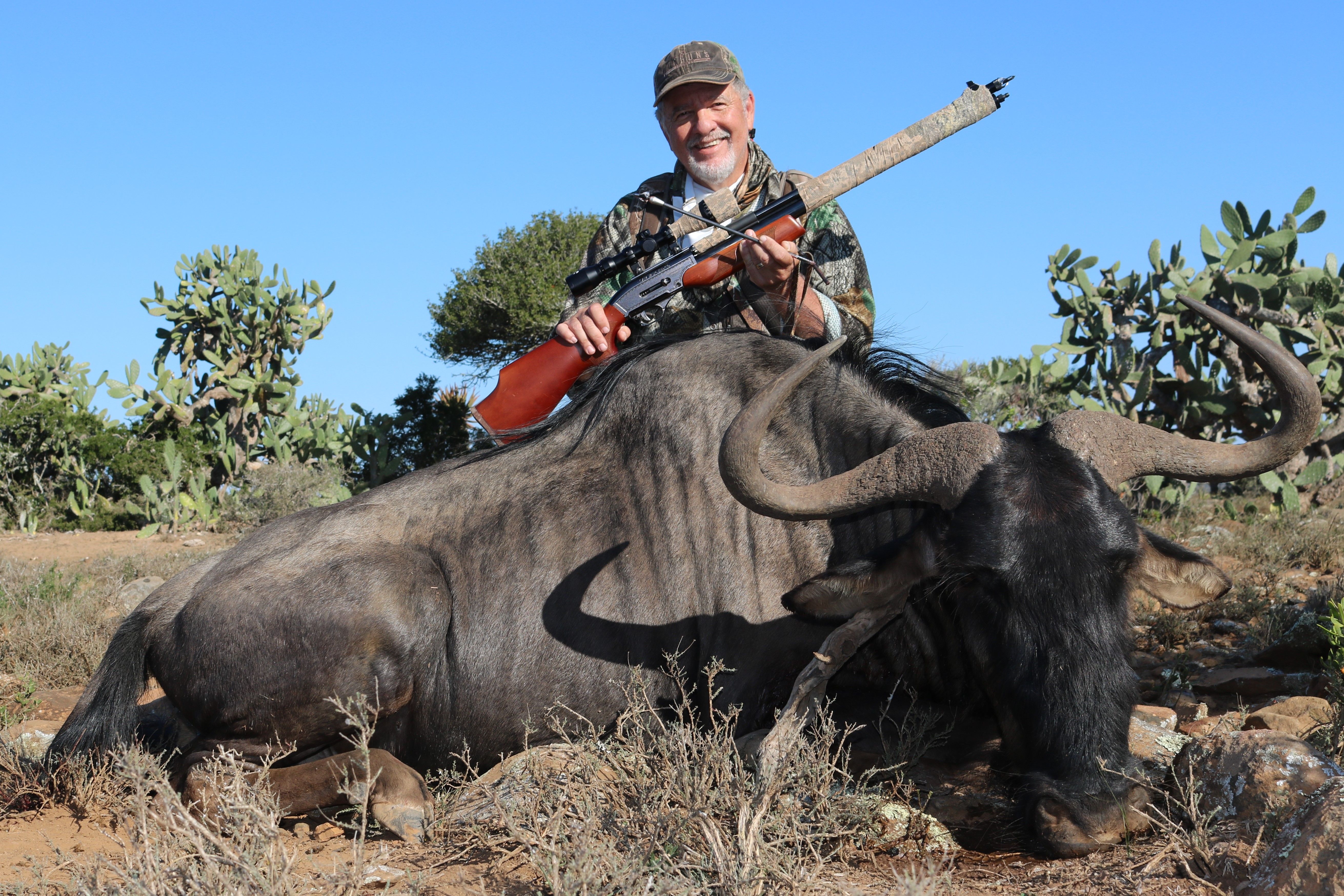We may earn revenue from the products available on this page and participate in affiliate programs. Learn More ›
Airgun shooting sports in the U.S. have seen substantial growth in recent years, across various disciplines such as field target, benchrest, and practical shooting like NRL .22. The number of hunters using airguns has also seen explosive growth, primarily for small game and pest control. However, one niche area that has been emerging into the mainstream is the use of the most powerful air rifles to hunt big game like pigs, deer, and even elk.
Just 20 years ago, the few custom and small-scale production big bores that existed were expensive and hard to find. There were also limited opportunities to hunt with them; primarily, invasive species such as feral hogs were the only legal quarry. But jumping to today, many states (in the U.S. and Canada) allow big-bore airguns for taking deer and other big game species. And along with this evolution in hunting regulations, there has been a surge in the number of companies offering big-bore airguns.
At the Outdoor Life air rifle test, we shot three of the most powerful air rifles head-to-head while evaluating their accuracy, ergonomics, and field shooting capability. After the test, I hunted with those three air rifles to see how they performed during real-world hunts. I’ve also included some of the other best big bores I’ve personally tested in the field and on the range.
What Is a Big Bore Air Rifle?
To get a handle on nomenclature, the definition of “big bore air rifle” for the purpose of this article will be a rifle in the .357 to .72 caliber that’s purpose designed to launch heavy lead slugs at distances of 50 to 100 yards, though many can reach out farther. These guns are all pre-charged pneumatics (PCP), using either high pressure compressed air or, less frequently, high pressure compressed nitrogen. Most of the guns run at pressures of 3000 psi to 4300 psi and, depending on design, can get anywhere from two to eight shots per fill at 215 ft-lbs to over 1,000 ft-lbs of energy. A .44 Magnum will produce 800 to 1,200 ft-lbs of energy for perspective.
The Top 3 Big Bore Airguns at a Glance
How We Tested The Most Powerful Air Rifles
Three testers assessed each rifle for accuracy, velocity/power, and general function and utility. Our indoor test range was limited to 45 yards maximum distance between bench and target, though I did a longer-range assessment before taking the rifles hunting.
The rifles were set up in an out-of-box configuration to replicate a buyer’s experience on receiving a new rifle. We added scopes and, when going into the field, a sling, but the rifles were otherwise stocked with factory presets. Some of these rifles allow power adjustments and, akin to handloading for a centerfire rifle, can be used to further optimize the rifle for a specific ammo type or application.
The three rifles tested were generating between 325 ft-lb to 565 ft-lb of energy, and for context Texas law requires a .30 caliber slug or larger, weighing at least 150 grains, generating 215 ft-lb energy for legally taking big game animals. So, all three of these rifles easily exceed the minimum requirement for what is arguably one of the strictest (and best) set of airgun hunting laws in the nation. We chronographed each air rifle with a Garmin Xero C1 chronograph. You’ll see the velocities and projectile weight for each big bore in the test results section in the reviews to follow.
During the controlled range testing we assessed characteristics such as handling, aesthetics, ergonomics, versatility, reliability and value, with a qualitative approach. Each of the three reviewers scored these parameters, averaging the team results, and used these averaged results to help rank the rifles.
Big-bore airguns are designed with a single purpose in mind: hunting. For this reason, I wanted to take a closer look at all three rifles under field conditions to see how they handled offhand and off sticks, how they carried, how maneuverable they were in tight conditions, how they cycled when the pressure was on, and to gauge my confidence in taking game with them.
Field Testing
Before taking a gun out to hunt, I did a quick range session to either sight in the rifle, or confirm the gun had maintained zero from previous use. I shot off sticks with the target at 75 yards to confirm that I could group three to four shots in the kill zone of my quarry at that distance. Then, I went hunting to see how it performed in the field.
This type of evaluation is not as controlled or free from individual bias as the range testing performed earlier. It was just me hunting in various conditions while noting performance. My field notes will serve as a reference to complement the range testing.
The Most Powerful Air Rifles: Reviews and Recommendations
Editors Choice: Umarex Hammer Carbine .50 Caliber
See It
Pros
- Compact
- Fast follow-up shots
- Good shot-to-shot consistency
- Accurate and powerful
Cons
- Substantial recoil
- No front bottle band to mount swivel
- No power adjustments
Test Results
- 45-yard group size: 1.36 inches
- 75-yard group size: 2.4 inches
- Trigger Pull : 3 pounds 10 ounces
- Velocity: 670 fps (550-grain slug)
- Energy: 565 ft-lb energy
Key Specification
- Semi-bullpup design
- Magpul pistol grip
- MN-LOK hand guard
- Length of barrel: 23.25 inches
- Length overall: 34.13 inches
- Magazine: 2-shot capacity
- Large volume air bottle: 35 cu-in
- Fill pressure: 4400 psi
While shooting the Hammer Carbine from a sitting position with the gun rested on Polecat bipod sticks, I could produce 75-yard groups under 2.5 inches on a consistent basis. I found the stock provided a good cheek weld and sight alignment, and the Magpul pistol grip offered a solid hold with easy access to the trigger, safety, and cocking bolt. The first three shots grouped well, with a slight drop in the fourth shot. The Hammer uses a two-shot linear shuttle magazine, which has functioned flawlessly throughout my shooting sessions. This compact little carbine has a substantial kick, but once acclimated was not a problem to manage.
I used this carbine on a two-day javelina hunt, during which I carried the rifle on my shoulder over miles of rough desert terrain. I also slipped it into the scabbard on my hunting e-bike to cover many more miles over washboard ranch roads. While stalking through some thick scrub, the gun was easy to maneuver, and when I finally had an opportunity on a boar, it was easy to get up on sticks and line up the shot. I hit the javelina with a quartering shot from the rear that passed through and broke the offside shoulder at 60 yards, anchoring him on the spot. The Hammer Carbine is one of the most comfortable and ergonomic big bores I’ve used. Even though it has substantial recoil — for an air rifle — it feels more like a push than a hard hit to the shoulder.
I really enjoyed carrying this gun in the field and found it was very ergonomic and comfortable to shoot offhand and off sticks. The carbine’s accuracy and power were spot on for big game hunting, and though 100 ft-lb lower power than the longer-barreled rifle version, I am happy to make that tradeoff for the more compact dimensions.
Runner Up: AirForce Texan
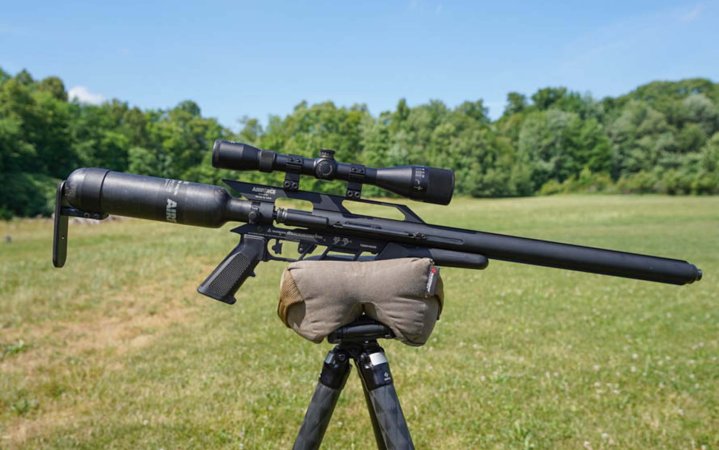
See It
Pros
- Accurate and powerful
- Compact and lightweight
- Several caliber options
- Tactile, light trigger
Cons
- Ergonomics require acclimatization
- Single shot
- Not regulated
Test Results
- 45-yard group size: 1.92 inches
- 75-yard group size: 2.7 inches
- Trigger pull: 2 pounds 8 ounces
- Velocity: 687 fps
- Energy: 576 ft-lbs of energy
Key Specifications
- 475 cc Airbottle (serves as buttstock)
- Ergonomic forestock and pistol grip
- Barrel Length: 25 inches
- Length Overall: 39 inches
- Single shot, side lever action
- Large volume air bottle
- 4 shots per fill
- Auto-deploy safety
I’ve used the AirForce Texan as one of my main big bore hunting guns for many years and think it could be argued that this is one of the most popular big bore air rifles on the market. I’ve used it in many calibers ranging from .257 to .50, and in both rifle and carbine configurations. This is a minimalist rig that’s lightweight and comfortable to carry. The Texan has a very nice adjustable trigger, and a side lever cocking action which is easy to cycle and provides excellent access to the single-shot loading port. The Texan uses the air tank for a buttstock, which allows for an efficient inline valve system but does negatively affect ergonomics for some shooters.
I used the .50 caliber carbine on a deer hunt last year while still hunting, hunting from ground blinds, and climbing into tree stands. The Texan carbine is the easiest big-bore airgun to pack because there are many slinging options, and I find it comfortable to shoot from most field positions. I find the gun shoulders well enough when shooting offhand and mounts on sticks pretty well, but I have to work to shoot it well from a prone position. It does a great job on heavy-bodied big game in terms of accuracy and power.
I was in the blind one morning when a nice buck came in at 65 yards and offered up a broadside shot. The 550-grain slug double-lunged him and came to rest just under the skin on the offside. The deer dropped cleanly, which is consistent with my past results on deer, hogs, and javelina.
The Texan lost a close race for best big bore because it’s a single shot, unregulated, and, probably the main concern, the buttstock’s ergonomics. Let me be clear: if you shoot the Texan or other Air Force rifles a lot, you will acclimate to the stock. However, I have seen quite a few shooters struggle to gain consistency and become comfortable with the bottle stock. So, while it is one of my favorite big-bore rifles, personally, it doesn’t quite gain the top spot. I would suggest that if you are shopping for a big-bore air rifle, you put the Texan on your shortlist and give it a try to see how you like it because this gun does have a lot going for it.
Read Next: The Best PCP Air Rifle Compressors
Best Budget: Seneca Dragonclaw II
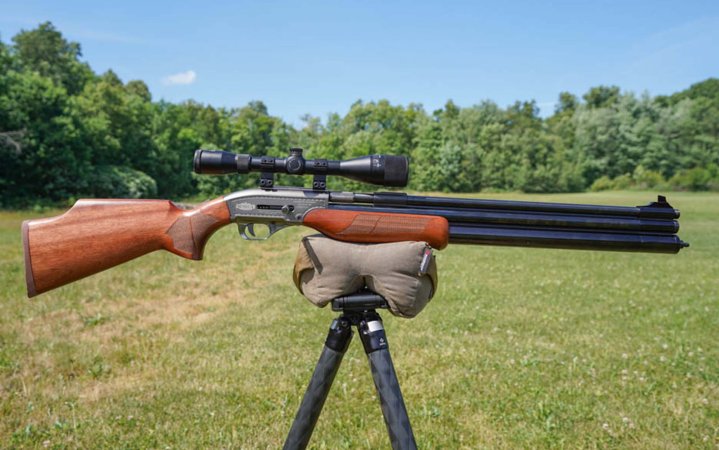
See It
Pros
- Great value
- Good ergonomics
- Works very well with Airbolts
Cons
- Heavy trigger pull (7.5 pounds)
- Lower end of the power spectrum
- Not regulated
- Action rough until broken in
Test Results
- 45-yard group size: 2.2 inches
- Trigger pull: 7 pounds 8 ounces
- Velocity: 687 fps (336-grain)
- Energy: 352 ft-lbs of energy
Key Specification
- Dual Air Reservoirs 500cc
- Hardwood Monte Carlo stock
- Length of barrel 21.65 inches
- Length overall 42.1 inches
- Single shot, side lever action
- 5-9 shots per fill
- Bolt action 2 power settings
- Scopable, Open sights included
This is another proven design that has existed for a few years. Of the rifles discussed so far, this is the most traditional design gun of the bunch. This rifle carries and shoulders well thanks to a Monte Carlo-style hardwood stock. It is a .50 caliber, bolt action gun, with high and low-power cocking positions that provide flexibility in power that can be selected on the fly.
The DragonClaw is lightweight, quick to mount, and a particularly good offhand shooter for me. Air is supplied via a dual under-barrel air reservoir and provides a shot count of 5 to 8 shots depending on power setting. One of the strengths of this platform is that it shoots lead slugs, roundball, and AirBolts, and is especially effective for airgun archery with the AirBolts.
I packed this rifle on a trip to South Africa where I hunted duiker with roundball, warthog with lead slugs, and wildebeest with the AirBolts. On one stalk after a large blue wildebeest, I moved within 60 yards using the DragonClaw and AirBolt tipped with a mechanical broadhead. I lined up the shot, standing with the gun resting on sticks, and launched the bolt on the high-power setting. The gun was generating 500 fps, surpassing just about any crossbow for power, and punched through both lungs anchoring the 800-pound animal within 30 yards. The features of the DragonClaw that I find compelling are the versatility and the value. Though this rifle has been around for several years, the manufacturer has made recent updates that have increased the power and shot count yet retained the budget-friendly pricing.
The DragonClaw is a workmanlike rifle that is not ridiculously overpowered for predator hunting (at low power) yet is more than adequate for hogs and deer. Using the DragonClaw with AirBolts on low power provides 7 to 8 shots at crossbow speeds. I’ve hunted in North America and Africa with this rifle, and it has been effective, reliable, and rugged. On the other hand, it can take quite a bit of shooting to break in the cocking bolt and trigger, and the rifle will benefit from a trigger tune right from the get-go. However, with a street price of about $720, this gun is the most affordable of the big bores currently available.
The Most Powerful Air Rifle: AEA Zeus
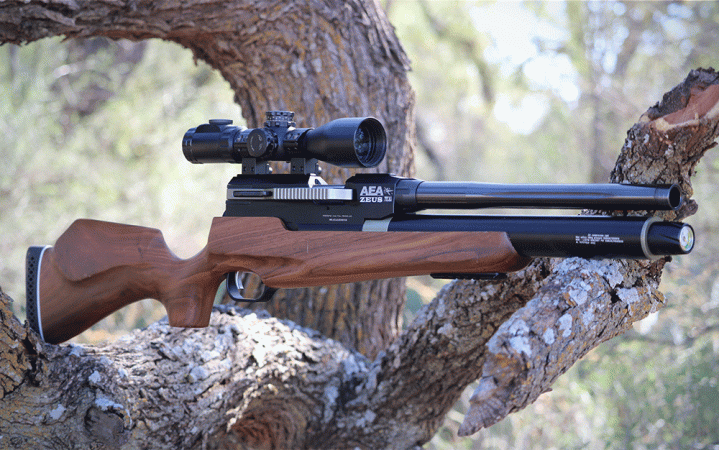
See It
Key Features
- Available in .58 and .72 caliber
- Barrel Lengths: 16, 24, and 32 inches
- Up to 1500 ft-lbs for .72 cal.
- Weight: 12 pounds
- Sidelever action
- Hardwood sporter style stock
- Threaded for DONNYFL moderator
Pros
- Very powerful
- Wide range of configurations (calibers and barrel lengths)
- Compact in shorter barrel lengths
- Purpose-designed moderator available
Cons
- Heavy (very heavy in long barrel versions)
- Loud (Unless suppressed)
For years the airgun companies have all claimed to manufacture the most powerful air rifle, and in fairness, this has been open to debate as they were close in performance. However, the AEA Zeus in .72 put that argument to rest, as it is clearly the most powerful. Do you need all that power? In most cases, probably not, but the intrinsic energy produced by this power plant allowed AEA to design short rifle and carbine versions of the .72 and add the .58 while maintaining a high-power output.
The AEA Zeus is a traditionally styled big-bore air rifle with a hardwood sporter-style stock. The wood and metal work on these rifles is solid to the point of being over engineered, not a bad thing in a gun generating power output up to 1500 ft-lbs. The added weight helps to dampen the recoil generated by a 500-grain slug traveling down the barrel at 1025 fps. I’ve used this gun to take a couple of massive Texan boar, and the terminal performance is outstanding. In my experience, the Zeus is a solid big game gun for the largest quarry.
Read our full AEA Zeus review to learn more.
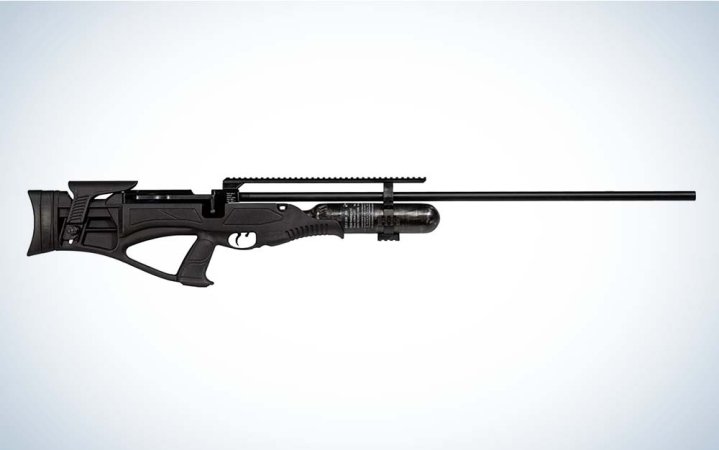
See It
Key Features
- Available in .457, .50, and .62 caliber
- Adjustable synthetic thumbhole stock
- Sidelever cocking action
- Easy access loading port accepts longer projectiles
- Several Picatinny rails for mounting accessories
Pros
- Accurate and powerful
- Rugged construction, reliable
- Generates six full power shots per fill
Cons
- Big and heavy
- Single shot (though loads rapidly)
I’ve been shooting the Hatsan Piledriver in the .457 and .50 caliber versions for a few years now, and have used it to take several deer, hogs, javelina, and exotics. This year Hatsan added the .62 caliber version to the lineup, generating over 750 ft-lbs with a 650-grain hollow point slug. This gun is a great performer with respect to accuracy, power, and reliability.
The PileDriver .62 is a bullpup configuration, but it is still a big gun. However, the .62 caliber clipped 4 inches off the 33-inch standard barrel bringing the overall length to 42 inches, and reducing the weight to a tad over 9.5 pounds. The synthetic thumbhole stock has an adjustable length of pull and cheekpiece. It uses a 480 cc carbon fiber tank to deliver up to five shots. The single-action gun cycles with a smooth side lever action, and loads quickly through easy access to the loading port. It also has Hatsan’s two-stage Quatro trigger, which is crisp, with a medium pull out of the box, and can be adjusted.
Airguns of Arizona Bushbuck
Airguns of Arizona is a major U.S. retailer that is especially well known as an importer of high-end European guns. But a few years ago, they began manufacturing a big bore rifle called the Bushbuck. To my eye, this is the best looking big bore rifle on the market. It is a bolt action sporter style rifle in .452 that is dressed in a laminate stock with stippling on the forestock and grip, with an adjustable cheekpiece. This rifle is solidly built and weighs in at 10.2 pounds with an overall length of 49.5 inches and a 30-inch barrel. My Bushbuck is the compact version. It is 43.5 inches long with a 22.5-inch barrel. After a point, I am usually willing to trade off some power for a more compact gun. The 285 cc air reservoir fills to 4500 psi using an unobtrusive under-barrel tube that helps maintain the rifle’s sleek lines, while providing two to four shots per fill. The single-shot Bushbuck has two power settings and generates over 600 ft-lb in the high setting. I’ve carried and used this gun on both North American and South African hunts, and it is a capable rifle for any non-dangerous game.
FAQs
A .177 pellet is not suitable for deer hunting. It is best used for small-game hunting and recreational shooting.
As we discussed earlier, not all rifles of the same caliber produce the same amount of energy. In general, a .22 caliber air rifle is suitable for varmints and small game.
The AEA Zeus in .72 caliber is the most powerful commercially available air rifle, and it has the largest caliber widely available. However, there are rare .82 caliber rifles also available through custom makers.
Final Thoughts on the Most Powerful Air Rifles
Every year, another state seems to add big bore airguns to their regulations as a valid method of take. The reason I believe the sport is gaining traction is that it straddles the skills of firearm and archery hunting. These guns are effective and efficient game-getters, based on traditional marksmanship and shooting skills, they require the hunter to move in closer and use their fieldcraft more in the spirit of bow hunting.
There are many powerful air rifles to choose from these days, more than ever before. This is a challenging and fun approach to hunting. There are many online stores with a wide selection of airguns, so access is not a problem for guns, ammo, and other adjunct gear. No FFL is required for airgun transactions, and in most states, there are no restrictions on having the gun shipped to your door. Also, remember that you will need a way to fill the gun, which either means a carbon fiber high-pressure air tank (and a place to refill it) and/or a compressor. These have come down in price in recent years but still need to be budgeted for. If you are a hunter and want to try something new, challenging, and a lot of fun, now is the time to give a big-bore air rifle a try.
Read the full article here
